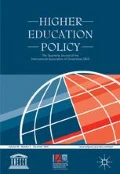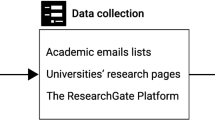Abstract
League tables are a common way for various competitive sports to judge team quality and identify winners and are also making increasingly frequent appearances in higher education globally. In this paper, we argue that this compilation of league tables is a product of the global hegemony of market-driven systems of higher education in which universities compete with each other for declining resources and students-as-customers. We explore why and how such exercises shape and define conceptualisations of the relative strength of organisations, and what the consequences of this are likely to be. Our analysis is grounded in a conceptualisation of universities, particularly in the UK, as marketised, neoliberal institutions for which rankings are essential to organisational transformation. We provide empirical data to support our argument via an exploration of the UK Association of Business Schools’ Academic Journal Quality Guide.
Similar content being viewed by others
Notes
This situation is rapidly changing. In April 2012 the College of Law, which has degree-awarding powers, was purchased by a private equity firm.
A particular form of research carried out by the university as a factory that only replicates and applies extant understandings more akin to consultancy is an exception in this respect. The processes that produce such knowledge can be standardised in terms of approaches, methodology and dissemination media. Labour can also be more closely directed in a capitalist enterprise sense, with a standardisation of skills embodied in staff. This form of research, however, is rather peripheral to the core knowledge production mission of the university.
To build the case of emergence and institutionalisation of the ABS Guide we traced back its versions and linked these to the career biographies of its authors; examined ABS official documents for the period after 2004; traced relevant media material; and used material from our empirical study.
The Research Assessment Exercise, now re-badged as the Research Excellence Framework, is a national evaluation system whereby academic units submit selected the academic output for assessment and are assigned a grade between 1* and 4*. For more on the RAE, please see Barker (2007).
As part of a general overhaul of policy for higher education and research in the UK, in 1992 the former polytechnics were formally rebranded as universities and brought under the same governance and resource allocation rules. Since these were organisations very different from the more ‘traditional’ universities, and differences still persist, analysis still distinguishes between pre- and post-1992 universities.
Interestingly, a dramatic increase of submissions to ‘highly ranked’ journals may in effect lower their quality as peer review becomes diluted and editorial control weakens.
Currently, many of the journals heading different journal rankings take 2 years or over to publish contributions. These delays can render results and papers obsolete and slow down careers.
References
ABS. (2005) ‘Association of Business Schools annual report 2004/5’, available at http://www.the-abs.org.uk/files//ANNUALREPORT.pdf, accessed 10 February 2011.
ABS. (2006) ‘Association of Business Schools annual report 2005/6’, available at http://www.the-abs.org.uk/files//11ABS%20ANNUAL%20REPORT%20FINAL.pdf, accessed 10 February 2011.
ABS. (2007) Academic Journal Quality Guide, in C. Harvey, H. Morris and A. Kelly (eds.) Association of Business Schools, January 2007, available at http://www.keele.ac.uk/cer/documents/ABS%20Journal%20Ranking%20Guide%20Introduction.pdf, accessed 10 February 2011.
ABS. (2011) ABS Academic Journal Quality Guide Version 4, available at http://www.associationofbusinessschools.org/node/1000257, accessed 20 November 2011.
ABS website. (2011) available at http://www.the-abs.org.uk/?cat=3, accessed 10 February 2011.
Adler, J. and Harzing, A-W. (2009) ‘When knowledge wins: Transcending the sense and nonsense of academic rankings’, Academy of Management Learning and Education 8 (1): 72–95.
Ariely, D. (2010) Predictably Irrational: The Hidden Forces that Shape Our Decisions, New York: HarperCollins.
Ashton, D., Beattie, V., Broadbent, J., Brooks, C., Draper, P., Ezzamel, M., Gwilliam, D., Hodgkinson, R., Hoskin, K., Pope, P. and Stark, A. (2009) ‘British research in accounting and finance (2001–2007): The 2008 research assessment exercise’, The British Accounting Review 41 (4): 199–207.
BAFA. (2010) ‘Open letter from Christine Helliar to Huw Morris’, available at http://www.baa.group.shef.ac.uk/BAA%20-%20Letter%20to%20ABS%20-%20April%202010.pdf, accessed 10 February 2011.
Barker, K. (2007) ‘The UK research assessment exercise: The evolution of a national evaluation system’, Research Evaluation 16 (1): 3–12(10).
Boden, R. and Epstein, D. (2006) ‘Managing the research imagination: Globalisation and research in higher education’, Globalisation, Societies and Education 4 (2): 223–236.
Boden, R. and Epstein, D. (2011) ‘A flat earth society? Imagining academic freedom’, Sociological Review 59 (3): 476–495.
Braverman, H. (1998) Labor and Monopoly Capital: The Degradation of Work in the Twentieth Century, New York: Monthly Review Press.
Foucault, M. (1965) Madness and Civilization: A History of Insanity in the Age of Reason (trans. R. Howard) New York: Vintage.
Foucault, M. (1975) The Birth of the Clinic (trans. A.M. Sheridan Smith) New York: Vintage.
Foucault, M. (1977) Discipline and Punish: The Birth of the Prison (trans. A. Sheridan) Harmondsworth: Penguin.
Foucault, M. (1978) The History of Sexuality, Volume 1: An Introduction (trans. R. Hurley) Harmondsworth: Penguin.
Goldthorpe, J.H., Lockwood, D., Bechhofer, F. and Platt, J. (1969) The Affluent Worker in the Class Structure, London and New York: Cambridge University Press.
Harvey, C., Kelly, A., Morris, H. and Rowlinson, M. (2011) ‘Journal rankings help define, not distort’, The TimesHigherEducation, 6–12 January.
Head, S. (2011) ‘The grim threat to British universities’, The New York Review of Books, available at http://www.nybooks.com/articles/archives/2011/jan/13/grim-threat-british-universities/?pagination=false.
Henkel, M. (2005) ‘Academic identity and autonomy in a changing policy environment’, Higher Education 49 (1): 155–176.
Hussain, S. (2010) ‘Accounting journals and the ABS quality ratings’, The British Accounting Review 42 (1): 1–16.
Jarratt Report. (1985) Report of the Steering Committee for Efficiency Studies in Universities, London: CVCP.
Jensen, M.C. and Meckling, W.H. (1976) ‘Theory of the firm: Managerial behaviour, agency costs and ownership structure’, Journal of Financial Economics 3 (4): 305–360.
Knorr-Cetina, K. (1982) ‘Scientific communities or transepistemic arenas of research? A critique of quasi-economic models of science’, Social Studies of Science 12 (1): 101–130.
Latour, B. and Woolgar, S. (1986) Laboratory Life: The Construction of Scientific Facts, Princeton, NJ: Princeton University Press.
Lowe, A. and Locke, J. (2006) ‘Constructing an ‘efficient frontier’ of accounting journal quality’, The British Accounting Review 38 (3): 321–341.
Marginson, S. (2006) ‘Dynamics of national and global competition in higher education’, Higher Education 52 (1): 1–39.
Marx, K. (2007 [1867]) Capital Critique of Political Economy Vol. I, New York: Cosimo, Inc.
Morris, H., Harvey, C. and Kelly, A. (2009) ‘Journal rankings and the ABS journal quality guide’, Management Decision 47 (9): 1441–1451.
Nedeva, M. and Boden, R. (2006) ‘Changing science: The advent of neo-liberalism’, Prometheus 24 (3): 269–281.
Ostrom, E. (1990) Governing the Commons: The Evolution of Institutions for Collective Action, Cambridge: Cambridge University Press.
RAE2008. (2009) ‘Main panel I overview report’, available at http://www.rae.ac.uk/pubs/2009/ov/, accessed 10 February 2011.
Rafols, I., Leydesdorff, L., O’Hare, A., Nightingale, P. and Stirling, A. (2011) ‘How journal rankings can suppress interdisciplinary research: A comparison between Innovation Studies and Business and Management’, SPRU Working Paper (submitted to Research Policy), available at http://www.sussex.ac.uk/Users/ir28/IDR/Rafols2011-Rankings&IDR.pdf.
Slaughter, S. and Rhoades, G. (2004) Academic Capitalism and the New Economy: Markets, State and Higher Education, Baltimore: The John Hopkins University Press.
Taylor, F.W. (2005) The Principles of Scientific Management, Fairfield: 1st World Library.
The Times Higher Education. (2011) ‘World University Rankings 2010–2011’, http://www.timeshighereducation.co.uk/world-university-rankings/, accessed 16 February 2011.
Tourish, D. (2010) ‘Performativity, metatheorising and journal rankings: What are the implications for emerging journals and academic freedom?’, Kent Business School Working Paper Series, Working Paper 233, November.
Waring, M. (2009) ‘Labouring in the Aegean stables? HRM and the reconstitution of the academic worker’, International Journal of Management Concepts and Philosophy 3 (3): 257–274.
Whitley, R. (2007) ‘Changing Governance of the Public Sciences: The Consequences of Establishing Research Evaluation Systems for Knowledge Production in Different Countries and Scientific Fields’, in R. Whitley and J. Glaser (eds.) The Changing Governance of the Sciences: The Advent of Research Evaluation Systems, Dortrecht: Springer, pp. 3–25.
Willmott, H. (2011) ‘Journal list fetishism and the perversion of scholarship: Reactivity and the ABS list’, Organization 18 (4): 429–442.
Wynne, B. (2003) ‘Seasick on the third wave? Subverting the hegemony of propositionalism: Response to Collins and Evans (2002)’, Social Studies of Science 33 (3): 401–417.
Author information
Authors and Affiliations
Rights and permissions
About this article
Cite this article
Nedeva, M., Boden, R. & Nugroho, Y. Rank and File: Managing Individual Performance in University Research. High Educ Policy 25, 335–360 (2012). https://doi.org/10.1057/hep.2012.12
Published:
Issue Date:
DOI: https://doi.org/10.1057/hep.2012.12




